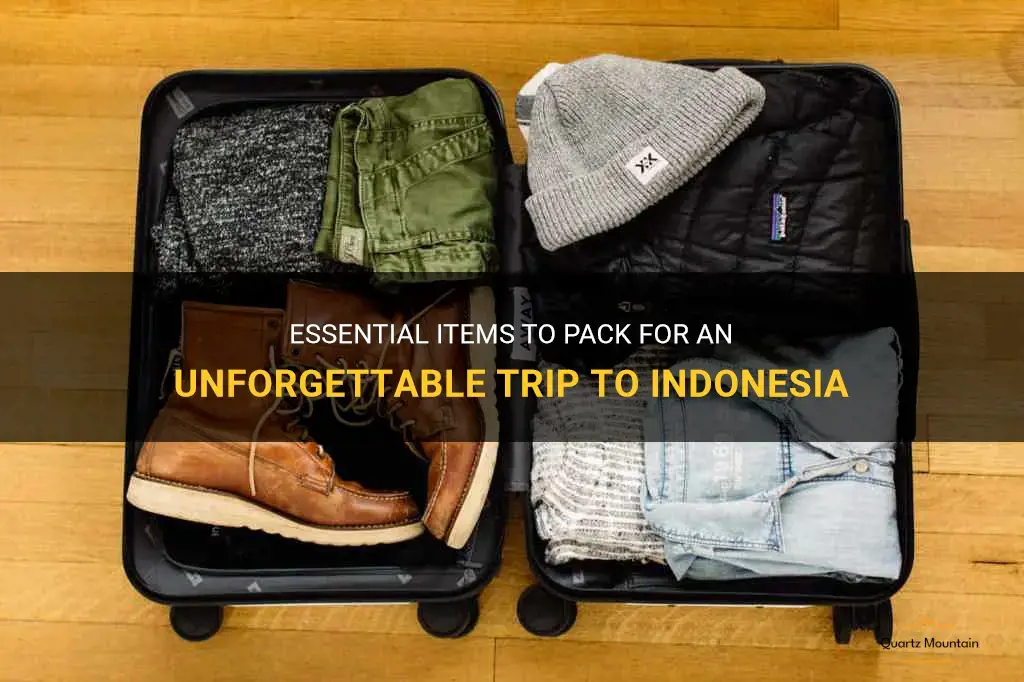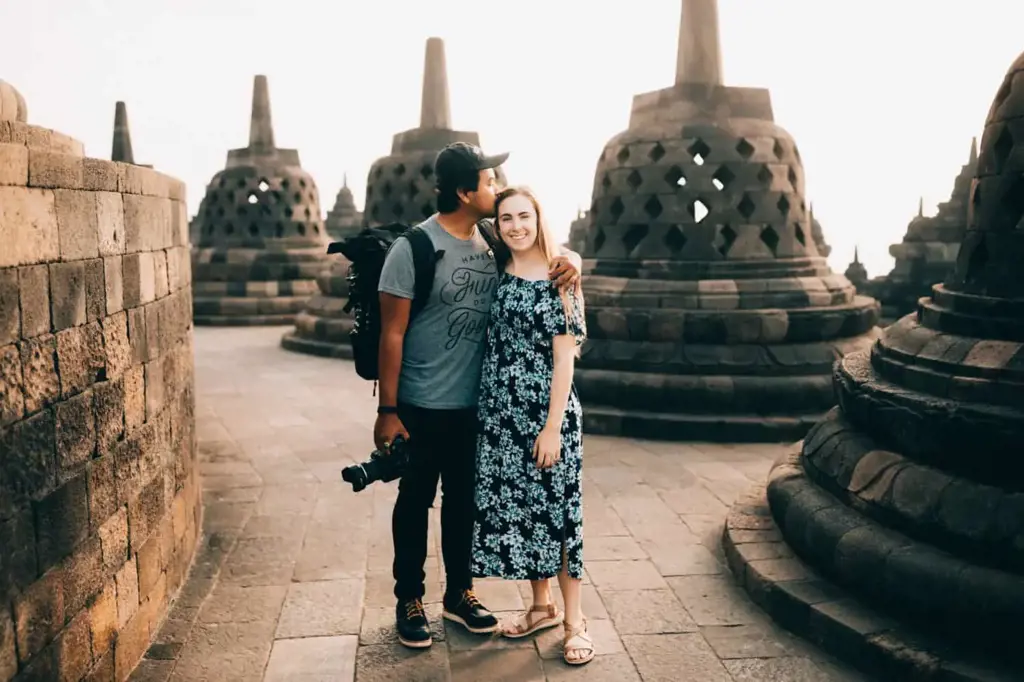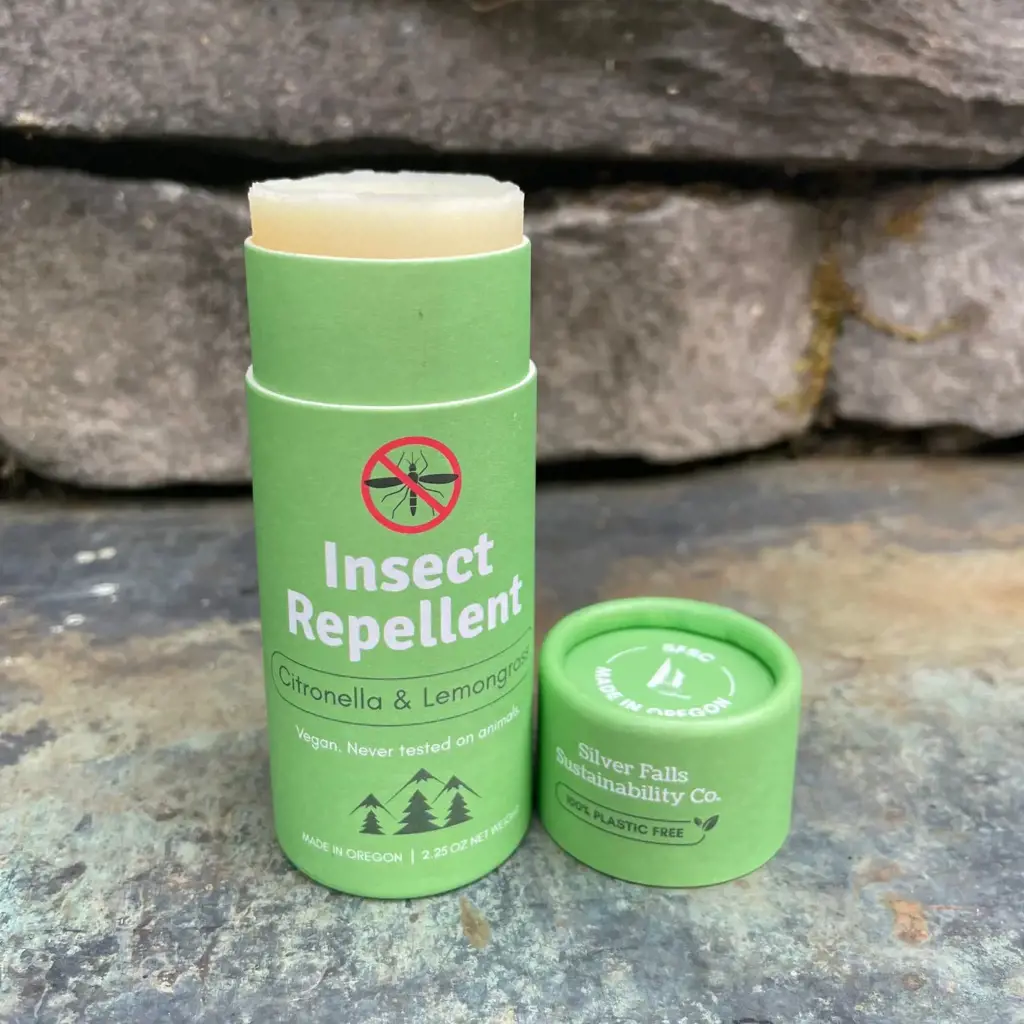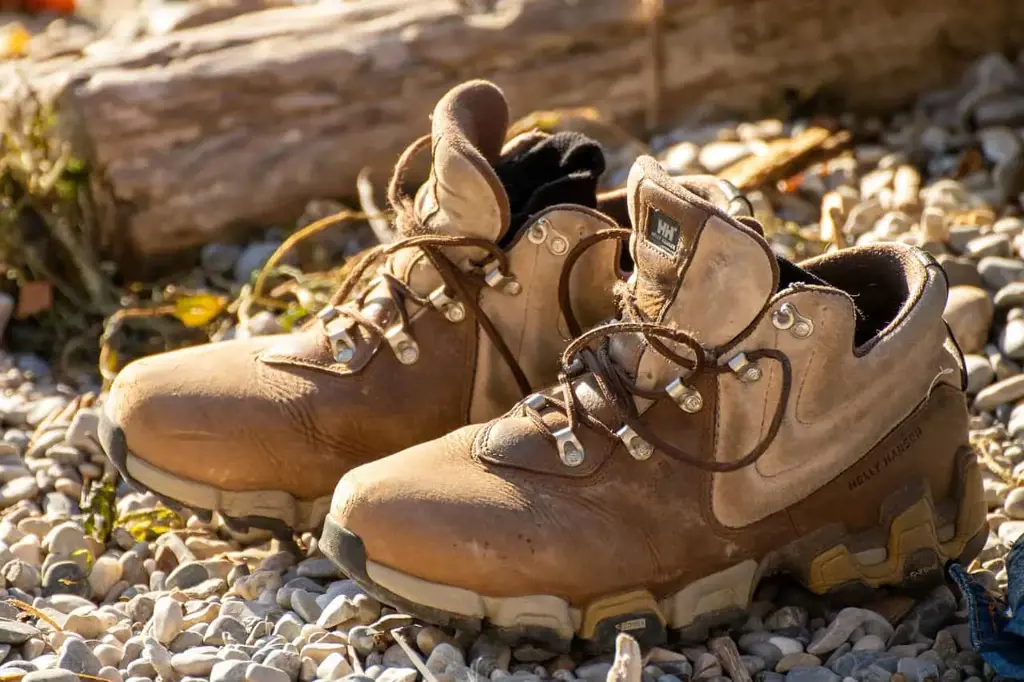
Indonesia, a sprawling archipelago known for its stunning landscapes, vibrant culture, and warm hospitality, is a dream destination for many travelers. From the lush jungles of Bali to the ancient temples of Yogyakarta, this diverse country offers a myriad of experiences for visitors to enjoy. However, with so much to see and do, it can be easy to overlook some essential items to make your trip truly unforgettable. Whether you're a seasoned traveler or embarking on your first adventure, here are some must-pack items to ensure you have an incredible time exploring Indonesia.
| Characteristics | Values |
|---|---|
| Climate | Tropical climate with high humidity |
| Weather | Hot and humid with frequent rain |
| Clothing | Lightweight and breathable clothing |
| Shoes | Comfortable and durable shoes |
| Swimwear | Swimsuits and cover-ups |
| Rain gear | Lightweight rain jacket or poncho |
| Sun protection | Sunscreen, hat, sunglasses |
| Insect repellent | Mosquito repellent and protective clothing |
| Medications | Basic first aid kit and necessary medications |
| Adapter | Universal power adapter |
| Electronics | Camera, smartphone, power bank, and chargers |
| Travel documents | Passport, visa, travel insurance, and photocopies |
| Money | Cash and credit/debit cards |
| Water bottle | Reusable water bottle |
What You'll Learn
- What clothing items should I pack for Indonesia's hot and humid climate?
- Are there any specific items I should pack for visiting temples or other religious sites in Indonesia?
- Is it necessary to pack mosquito repellent for a trip to Indonesia?
- What kind of footwear should I bring for activities like hiking or exploring natural areas in Indonesia?
- Are there any cultural considerations or dress codes that I should be aware of when packing for Indonesia?

What clothing items should I pack for Indonesia's hot and humid climate?

When traveling to Indonesia, it's important to pack clothing that is suitable for the hot and humid climate. The tropical climate in Indonesia means that temperatures are often high, with high levels of humidity. This can make it uncomfortable to wear certain types of clothing, so it's important to choose clothing that will keep you cool and comfortable.
One of the key considerations when choosing clothing for Indonesia is the fabric. It's best to choose lightweight, breathable fabrics such as cotton or linen. These natural fabrics allow air to circulate and can help to keep you cool in the heat. Avoid synthetic materials, as these can trap heat and make you feel even hotter.
It's also important to choose clothing that is loose-fitting. Tight clothes can be uncomfortable in the heat and can prevent air from circulating around your body. Opt for loose-fitting tops and dresses, and choose trousers or skirts that have a relaxed fit. Loose, flowing clothing will not only help to keep you cool, but it can also help to protect your skin from the sun.
When it comes to tops, choose sleeveless or short-sleeved options to allow your arms to stay cool. However, it's important to note that some religious sites in Indonesia require visitors to cover their shoulders. In these cases, it's handy to have a lightweight cardigan or shawl that you can easily throw on when needed.
Shorts and skirts are great options for bottoms in Indonesia, as they allow air to circulate around your legs. However, it's important to be aware of local customs and traditions. In some more conservative parts of Indonesia, it may be more appropriate to wear longer shorts or skirts that cover the knees.
Don't forget to pack a hat and sunglasses to protect yourself from the sun. A wide-brimmed hat will provide shade for your face and neck, while sunglasses will protect your eyes from the bright sunlight.
In terms of footwear, opt for comfortable and breathable shoes. Sandals or flip-flops are a staple in Indonesia due to their breathability and ease of wear. They are perfect for walking around in the heat and can easily be slipped off when visiting temples or entering someone's home.
Finally, it's important to pack clothing that is appropriate for the activities you plan on doing in Indonesia. If you plan on hiking or spending time in more rural areas, lightweight and quick-drying clothing is essential. If you plan on visiting more upscale restaurants or attending formal events, it may be necessary to pack some slightly more formal attire.
In conclusion, when packing for Indonesia's hot and humid climate, it's important to choose lightweight and breathable clothing made from natural fabrics. Opt for loose-fitting tops and bottoms, and remember to pack a hat and sunglasses for sun protection. Consider the cultural and religious customs of the areas you plan to visit, and pack accordingly. With the right clothing, you can stay cool and comfortable during your time in Indonesia.
Essential Items to Include in Your PGL Packing List
You may want to see also

Are there any specific items I should pack for visiting temples or other religious sites in Indonesia?

When visiting temples or other religious sites in Indonesia, it is important to show respect and adhere to certain customs and traditions. One way to do this is by packing certain items that will help you navigate these sites appropriately. Here are some items you should consider including in your bag when visiting temples or other religious sites in Indonesia.
- Sarong or Scarf: Many temples in Indonesia require visitors to dress modestly and cover their legs or shoulders. It is always a good idea to carry a sarong or a scarf that you can wrap around yourself if needed. This will not only show respect for the religious customs but also allow you to enter the temple without any issues.
- Head Covering: Some temples may require visitors to cover their heads as a sign of reverence. It is recommended to carry a hat or a light scarf that can be used to cover your head when needed. This is especially important for women, as certain temples have stricter clothing regulations for females.
- Offerings: When visiting temples, it is customary to make offerings as a way of showing respect to the deities or spirits worshipped there. These offerings usually consist of flowers, incense, and sometimes food. It is a good idea to carry some flowers or incense sticks that you can offer when you visit the temple. However, it is crucial to check the specific customs and regulations of each temple, as some may discourage or forbid certain types of offerings.
- Hand Sanitizer: It is always a good idea to carry hand sanitizer when visiting temples or other religious sites, especially if you plan to partake in any rituals or ceremonies. This will ensure that you maintain good hygiene and prevent the spread of germs, considering that these sites are often visited by a large number of people.
- Camera or Smartphone: Indonesia is home to some breathtaking temples and religious sites, and you would not want to miss capturing those moments. Make sure to carry your camera or smartphone to take photos of the sites, but remember to be respectful and follow any rules or guidelines regarding photography in place at the particular temple or religious site.
In addition to these items, it is essential to remember some general guidelines when visiting temples in Indonesia. Always be mindful of your behavior and avoid any actions that may be considered disrespectful or intrusive. Follow the instructions given by the temple staff or guides, and be aware of any specific rules or regulations that apply to the temple you are visiting. By showing respect and being sensitive to the customs and traditions of the place, you will have a more meaningful and enjoyable experience when exploring the temples and religious sites in Indonesia.
Essential Items to Pack for Your Door County Getaway
You may want to see also

Is it necessary to pack mosquito repellent for a trip to Indonesia?

Indonesia, with its stunning landscapes, rich cultural heritage, and warm climate, is a popular tourist destination. However, it is also known for its abundant mosquito population and the diseases they carry, such as dengue fever, malaria, and Zika virus. Therefore, it is highly advisable to pack mosquito repellent when traveling to Indonesia.
Scientifically, mosquitoes are attracted to human sweat, body odor, and the carbon dioxide we exhale. Mosquito repellents work by creating a barrier that prevents mosquitoes from detecting these attractants. The active ingredients in most repellents, such as DEET or picaridin, interfere with mosquitoes' ability to sense their target, reducing the likelihood of bites.
Apart from the scientific evidence, many travelers have shared their experiences of encountering mosquitoes in Indonesia. It is not uncommon to hear stories of tourists being overwhelmed by mosquito bites, especially in areas with high humidity and dense vegetation. The mosquito population is more active during dusk and dawn, but they can be present throughout the day as well. Hence, it is crucial to be prepared and use mosquito repellent regularly.
Here is a step-by-step guide on how to use mosquito repellent effectively during your trip to Indonesia:
- Choose a repellent with at least 20% DEET or 20% picaridin. These ingredients provide longer-lasting protection and are effective against a wide range of mosquito species.
- Apply the repellent to all exposed areas of skin, including arms, legs, and neck. Take care to avoid contact with eyes, mouth, and open wounds.
- Reapply the repellent every few hours or according to the product instructions. Sweating and swimming can reduce the effectiveness of the repellent, so make sure to reapply after these activities.
- Use mosquito nets or screens in your accommodation to create an extra barrier against mosquitoes, especially during sleep.
- Wear light-colored, loose-fitting clothing that covers most of your body. Mosquitoes are attracted to dark colors, so opting for lighter colors can help reduce bites.
It is essential to note that while mosquito repellents are effective, they are not foolproof. Additional measures to protect yourself from mosquito bites include wearing long sleeves and pants, avoiding heavily wooded areas, and being aware of your surroundings.
To further emphasize the importance of packing mosquito repellent when traveling to Indonesia, consider the following examples:
- Mary, a tourist from Australia, visited Bali without packing mosquito repellent. She spent most of her evenings outdoors and ended up contracting dengue fever. She experienced symptoms such as high fever and severe joint pain, which required medical attention. Mary's experience serves as a cautionary tale for travelers to be proactive in protecting themselves against mosquito-borne diseases.
- John, another traveler, came prepared with mosquito repellent when he visited Yogyakarta, a popular tourist city in Indonesia. He diligently applied the repellent during his stay and managed to avoid mosquito bites. John had a worry-free trip and returned home without falling ill.
In conclusion, packing mosquito repellent is crucial when traveling to Indonesia. The scientific evidence, coupled with the experiences of fellow travelers, highlights the necessity of protection against mosquito-borne diseases. By following the steps outlined above and taking additional precautions, you can enjoy your trip to Indonesia with peace of mind.
Essential Items to Pack for an Aulani Vacation
You may want to see also

What kind of footwear should I bring for activities like hiking or exploring natural areas in Indonesia?

Indonesia is a country known for its stunning natural beauty, from lush rainforests to breathtaking mountains and pristine beaches. If you are planning on visiting and exploring these natural areas, it's important to pack the right footwear to ensure a comfortable and safe experience. Here are some tips on what kind of footwear to bring for activities like hiking or exploring natural areas in Indonesia:
- Hiking Boots: For serious hiking or trekking adventures, a good pair of hiking boots is essential. Look for boots that provide ankle support and have a good grip on the sole to help you navigate through challenging terrain. Make sure the boots are comfortable and well-fitted to prevent blisters or discomfort during long hikes.
- Trail Running Shoes: If you are planning on doing a mix of hiking and running through the trails, trail running shoes are a great option. These shoes are designed with extra support and cushioning to handle the impact of running on uneven surfaces. Look for shoes with a durable outsole and a protective toe cap for added safety.
- Sandals or Flip Flops: While hiking boots or trail running shoes are a must for serious outdoor activities, it's also important to pack a pair of sandals or flip flops for more relaxed outings or beach visits. These shoes will offer breathability and comfort in hot and humid conditions, and they are easy to slip on and off.
- Water Shoes: If you plan on exploring rivers, waterfalls, or snorkeling in Indonesia, having a pair of water shoes is essential. These shoes are designed to be lightweight, quick-drying, and provide good grip on slippery surfaces. They will help protect your feet from sharp rocks and provide better traction in water.
- Socks: Don't forget to pack a few pairs of good quality socks. Look for socks that are made of moisture-wicking materials to keep your feet dry and prevent blisters. Avoid cotton socks as they tend to retain moisture and can lead to uncomfortable wet feet.
- Extra Laces and Insoles: It's always a good idea to pack some extra laces and insoles for your hiking boots or shoes. Laces can break or get damaged on rugged trails, and having extra ones can save the day. Insoles can provide additional cushioning and support, especially if you have high arches or foot conditions.
Remember, it's important to break in your hiking boots or shoes before your trip to avoid discomfort or blisters. Wear them around the house or on shorter walks to allow your feet to adjust to the footwear. Additionally, always check the weather conditions for the areas you'll be visiting and pack accordingly. Waterproof footwear may be necessary during rainy seasons or if you plan on crossing rivers.
In conclusion, having the right footwear is crucial for a comfortable and safe experience when exploring the natural areas of Indonesia. Whether it's hiking boots for challenging treks or sandals for more relaxed outings, make sure to pack the appropriate footwear for each activity. Don't forget to prioritize comfort, support, and protection for your feet to fully enjoy the beauty of Indonesia's natural wonders.
Your Essential Packing List for Europe in April: Everything You Need for a Perfect Trip
You may want to see also

Are there any cultural considerations or dress codes that I should be aware of when packing for Indonesia?

When traveling to Indonesia, it is important to be aware of the cultural considerations and dress codes in order to respect local customs and traditions. Indonesia is a diverse country with various ethnic groups and religions, each with their own unique cultural practices. Here are some essential things to know when packing for your trip to Indonesia.
- Modest Clothing: As Indonesia is a predominantly Muslim country, it is important to dress modestly, especially when visiting religious sites or rural areas. Both men and women should avoid wearing revealing clothing such as shorts, tank tops, or low-cut tops. It is advisable to wear loose-fitting and lightweight clothing made from breathable fabrics, such as cotton or linen, to cope with the hot and humid weather.
- Knees and Shoulders Covered: When visiting temples or mosques, it is essential to have your knees and shoulders covered. Women should carry a scarf with them to cover their head as a sign of respect when entering places of worship. It is also a good idea to wear comfortable shoes as you may need to remove them when entering certain religious sites.
- Swimwear: While swimwear is acceptable at beach resorts and tourist areas, it is important to cover up when you are outside these areas. Wearing a cover-up or a sarong is advisable when walking to and from the beach or pool. It is also worth noting that topless sunbathing is not acceptable in Indonesia.
- Cultural Sensitivity: It is essential to respect the local customs and traditions when in Indonesia. Avoid touching people's heads, as it is considered rude. The left hand is considered unclean, so always use your right hand for greetings, eating, and giving or receiving items. Showing anger or displaying affection in public is also considered inappropriate.
- Business Attire: If you are traveling to Indonesia for business purposes, it is important to dress professionally. Men should wear suits or traditional Indonesian attire such as batik shirts, while women should opt for modest and conservative attire such as skirts or dresses that cover the knees.
- Footwear: Indonesians often remove their shoes before entering homes or certain establishments. It is a good idea to pack slip-on shoes or sandals that are easy to take off and put on. This will not only help you blend in but also keep the floors clean.
- Weather Considerations: Indonesia has a tropical climate, so it is essential to pack appropriate clothing to cope with the heat and humidity. Lightweight and breathable fabrics are recommended. Don't forget to pack a hat, sunglasses, and sunscreen to protect yourself from the strong sun.
In conclusion, when packing for Indonesia, it is important to be aware of the cultural considerations and dress codes to respect the local customs and traditions. Dress modestly, cover knees and shoulders when visiting religious sites, and be mindful of cultural sensitivity. By following these guidelines, you can ensure a pleasant and respectful experience during your trip to Indonesia.
Packing a Perfect Back-to-School Lunch: Essential Tips and Tricks
You may want to see also
Frequently asked questions
When packing for Indonesia, it is best to bring lightweight, breathable clothing that will help you stay cool in the tropical climate. Opt for loose-fitting tops, shorts, and dresses made from natural fabrics like cotton or linen. Don't forget to pack a few long-sleeved shirts and long pants for mosquito protection and cultural sites that may require more modest attire.
Yes, it is highly recommended to pack insect repellent and sunscreen when traveling to Indonesia. Mosquito-borne illnesses like dengue fever and malaria are prevalent in certain areas, so using a mosquito repellent with at least 30% DEET is essential. Additionally, the sun can be strong in Indonesia, so be sure to pack a broad-spectrum sunscreen with SPF 30 or higher to protect your skin from harmful UV rays.
It is advisable to pack a lightweight rain jacket or umbrella when visiting Indonesia, especially if you are traveling during the wet season. Rainfall can be heavy and frequent in many parts of the country, so having a waterproof layer or an umbrella can help keep you dry and comfortable during sudden rain showers.
When choosing footwear for Indonesia, comfort and versatility are key. Opt for a pair of sturdy walking shoes or hiking sandals for exploring nature and hiking. For beach destinations, pack a pair of flip-flops or sandals that can handle sand and water. It's also a good idea to bring a pair of lightweight, breathable sneakers or closed-toe shoes for city sightseeing or visits to religious sites that require covered footwear.
It is always a good idea to pack essential medications and a basic first aid kit when traveling to any destination. In Indonesia, you may want to include items such as anti-diarrheal medication, anti-motion sickness medication, pain relievers, bandaids, and antiseptic ointment. It's also a good idea to bring any prescription medications you may need and consult with your doctor before your trip to ensure you have everything you need in case of emergencies.







